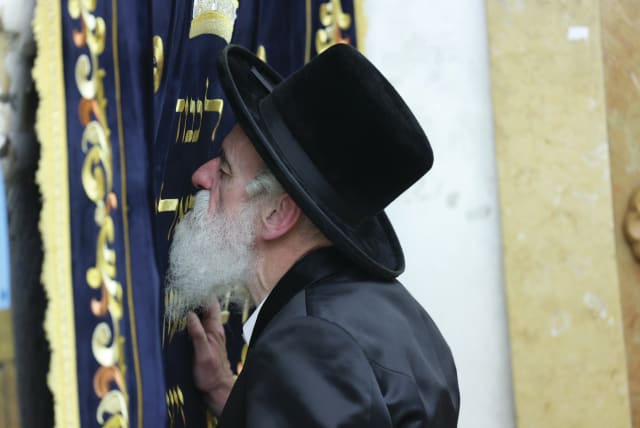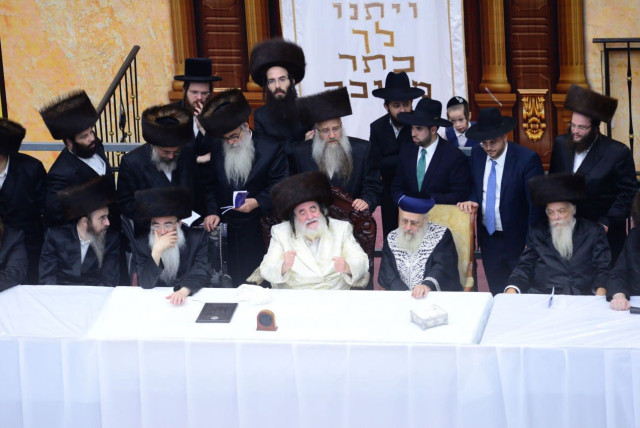Israel-Hamas war: A Hassidic rebbe's prayer for soldiers

The text that was recited was not the well-known version of the prayer for IDF soldiers; it predates that prayer, and is meant to underscore that battles are won with prayers, not armed fighting.
Like other mainstream hassidim, Vizhnitz Hassidim do not serve in the IDF, nor do they actively support soldiers. Yet on the first Shabbat following the Simchat Torah massacre, the Vizhnitzer Rebbe, Rabbi Yisrael Hager (b. 1945), chose to say a prayer for the soldiers.
After he was called to the Torah in his Bnei Brak synagogue and completed the reading, the Vizhnitzer Rebbe added: “He who blessed our ancestors, Abraham, Isaac, and Jacob, may He bless and safeguard and assist and protect and save all our brethren, the house of Israel, who stand in battle against those who hate Israel. As the entire congregation blesses them and prays for them. In merit of this, may the Holy One, blessed be He, watch over them and save them from all harm, and cause peoples to be subject to them, and let five of them pursue 100, and 100 of them pursue 10,000, and wherever they turn they will succeed, and our enemies will fall before them by the sword, and they will return in peace to their tents.
“[God will] cause them to recuperate, heal them, strengthen them, and revive them. And may He send them from heaven complete recovery for all their limbs and their sinews, together with all Jews who are ill, a healing of the soul and a healing of the body, now, soon, and in the near future, and let us say amen.
“And whoever has fallen into captivity, may the Holy One, blessed be He, be filled with mercy for them, and grant them mercy before their captors, and rescue the prisoner from confinement, and proclaim release for the captives and liberation for the imprisoned, and speedily return them to their homes in peace. Amen.”
The event was widely reported in the haredi press and in the Religious Zionist press, both in Hebrew and in English. The excitement was justified, as there was no historical precedent for what the Vizhnitzer Rebbe did on that Shabbat.
What prayer for soldiers did the Vizhnitz rebbe say?
The text that was recited was not the well-known version of the prayer for IDF soldiers; it predates that prayer. This prayer was composed by Rabbi Menahem Mendel Reuven Gefner (1905-1988), who moved to Palestine in 1924, and is famous for instituting the biannual Birkat Kohanim (Priestly Blessing) gathering at the Western Wall. The prayer appears in the 2001 hagiographic account of Rabbi Gefner’s life written by his grandson Baruch Gefner, who is a follower of Rabbi Yisrael Hager of Vizhnitz.
This biography is colored by much vitriol against army service. Thus, when recounting the events of 1948 that culminated in the establishment of the state, armed fighting against the Arabs is depicted as futile. Prayer was the only avenue for Jewish survival, and “on this front Rabbi Mendel Gefner positioned himself as the military leader.”
Using army terms, the grandson explained how Rabbi Gefner marshaled the troops for a continuous attack against the enemy: “While people were walking around the streets looking for sandbags to block the windows of their house out of fear of the bombings, he would stand in the middle of the city... and call with gusto: ‘Psalms, gentlemen, Psalms alone will help us!’”
The message is clear: Battles are won with prayers. The narrative continues in this vein with the sound of artillery fire competing with the sounds of prayer of “Rabbi Mendel Gefner and his troops,” who repeatedly completed the Book of Psalms, blew the shofar, and recited supplications for 100 days. At the end of each prayer shift, Rabbi Gefner would add the aforementioned prayer. The chapter concludes with victory over the Arab armies, credited without hesitation to the Psalms and prayers.
RABBI MENDL GEFNER’S text was recalled later in the context of the 1973 Yom Kippur War. The war formally ended with a ceasefire agreement between Israel, Egypt, and Syria that came into effect on October 24, 1973. Alas, fighting continued, and over 300 Israeli soldiers were held captive, most by Egypt, some by Syria, and a few by Lebanon. It was in this context that Rabbi Gefner’s text was reprinted on November 1, 1973, a week after the official end of the war.
The 1973 text was slightly different from the 1948 version, which was the version that the Vizhnitzer Rebbe reportedly recited. The most significant difference was invoking the names of more ancestors, including the Four Mothers: “May He who blessed our ancestors, Abraham, Isaac, and Jacob, Moses, Aaron, David, and Solomon, Sarah, Rebecca, Rachel, and Leah....”
Furthermore, the page included a postscript: “The above version was approved by the gaon of Tchebin, may the memory of the righteous be a blessing, and the rabbi, the gaon, Rabbi Isser Zalman Meltzer [1870-1953], may the memory of the righteous be a blessing.”
The “gaon of Tchebin” is a reference to Rabbi Dov Berish Weidenfeld (1881-1965), who served as the rabbi of Trzebinia, Poland, from 1923 until the Second World War. Rabbis Weidenfeld and Meltzer were two of the most respected Talmudists in Jerusalem at the time, and their imprimatur was a strong endorsement. (However, the circumstances of their approval, presumably in 1948, are not detailed.)
WHILE THE Vizhnitzer Rebbe’s addition on that first Shabbat after the slaughter was widely reported, no such reports were forthcoming a week later. It seems that the addition was a one-time response to the gravity of the military situation and the tragedy that had just unfolded.
This leads to a sober assessment of the Vizhnitzer Rebbe’s conduct.
On one hand, he recognized the enormity of the moment, sought an appropriate prayer response, and drew from the wealth of Jewish experience. He personally and publicly offered a prayer for those “who stand in battle against those who hate Israel.” On this account, the Vizhnitzer Rebbe deserves credit for his response.
On the other hand, this was not a watershed moment. There was no explicit mention of the IDF or the State of Israel. More significantly, the prayer did not become a public mainstay among Vizhnitz Hassidism, and by the second Shabbat after the massacre it was already fading from memory.
Time will tell whether there will be reverberations of the Vizhnitzer Rebbe’s prayer for those “who stand in battle against those who hate Israel.”■
The writer is a senior faculty member at the Pardes Institute of Jewish Studies and is a rabbi in Tzur Hadassah.
Jerusalem Post Store
`; document.getElementById("linkPremium").innerHTML = cont; var divWithLink = document.getElementById("premium-link"); if (divWithLink !== null && divWithLink !== 'undefined') { divWithLink.style.border = "solid 1px #cb0f3e"; divWithLink.style.textAlign = "center"; divWithLink.style.marginBottom = "15px"; divWithLink.style.marginTop = "15px"; divWithLink.style.width = "100%"; divWithLink.style.backgroundColor = "#122952"; divWithLink.style.color = "#ffffff"; divWithLink.style.lineHeight = "1.5"; } } (function (v, i) { });

